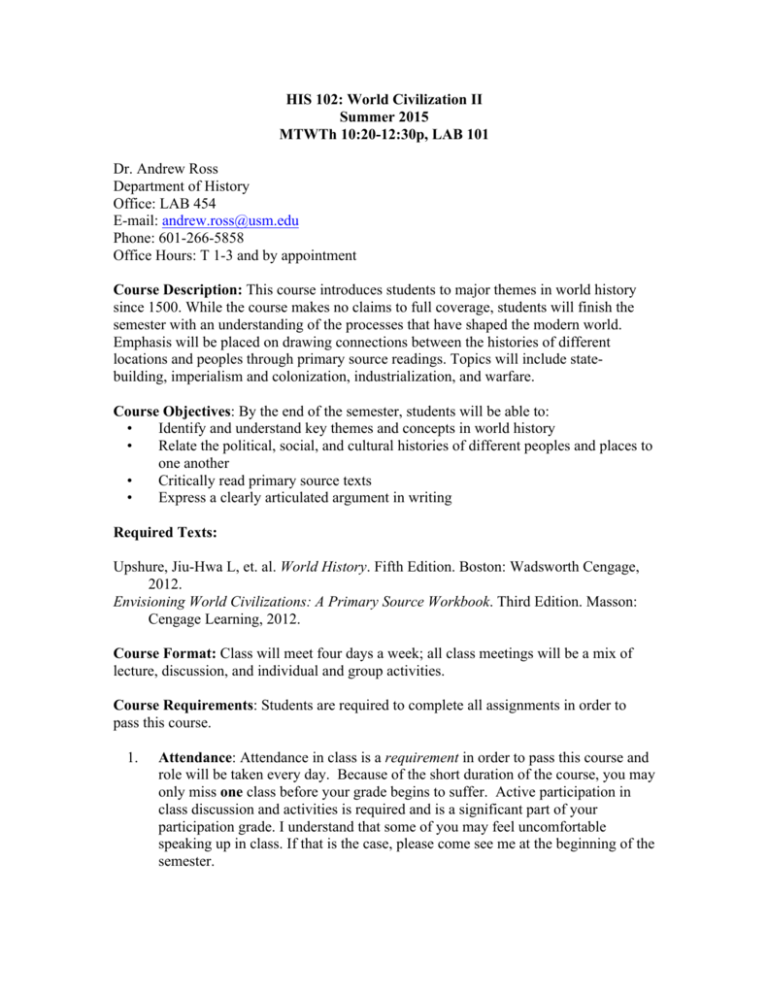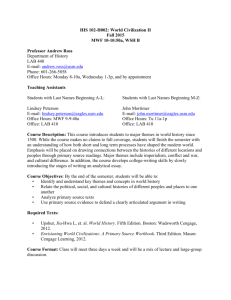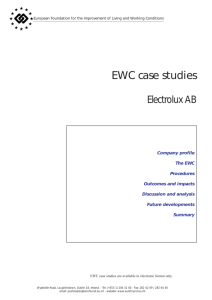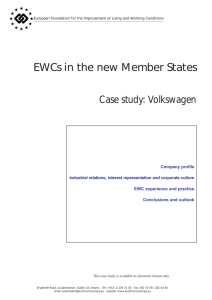World Civilizations II
advertisement

HIS 102: World Civilization II Summer 2015 MTWTh 10:20-12:30p, LAB 101 Dr. Andrew Ross Department of History Office: LAB 454 E-mail: andrew.ross@usm.edu Phone: 601-266-5858 Office Hours: T 1-3 and by appointment Course Description: This course introduces students to major themes in world history since 1500. While the course makes no claims to full coverage, students will finish the semester with an understanding of the processes that have shaped the modern world. Emphasis will be placed on drawing connections between the histories of different locations and peoples through primary source readings. Topics will include statebuilding, imperialism and colonization, industrialization, and warfare. Course Objectives: By the end of the semester, students will be able to: • Identify and understand key themes and concepts in world history • Relate the political, social, and cultural histories of different peoples and places to one another • Critically read primary source texts • Express a clearly articulated argument in writing Required Texts: Upshure, Jiu-Hwa L, et. al. World History. Fifth Edition. Boston: Wadsworth Cengage, 2012. Envisioning World Civilizations: A Primary Source Workbook. Third Edition. Masson: Cengage Learning, 2012. Course Format: Class will meet four days a week; all class meetings will be a mix of lecture, discussion, and individual and group activities. Course Requirements: Students are required to complete all assignments in order to pass this course. 1. Attendance: Attendance in class is a requirement in order to pass this course and role will be taken every day. Because of the short duration of the course, you may only miss one class before your grade begins to suffer. Active participation in class discussion and activities is required and is a significant part of your participation grade. I understand that some of you may feel uncomfortable speaking up in class. If that is the case, please come see me at the beginning of the semester. 2. Readings: Complete all readings for the day they are listed on the syllabus. Primary source readings listed in the syllabus, but not included in our class texts, will be available on Blackboard or online. Please bring your primary sources with you the day they are due. 3. Reading Exercises: You will complete four of the exercises (one a week) contained the bottom of primary sources chosen by me. These are listed in the syllabus. Each exercise should be between 1 and 1.5 pages long. 4. Exams: Three exams will be given on the dates listed below. Format for all exams will be a mix of identification and essay. IDs require you to identify a quote or term (including an approximate date) and its significance. Essays require you to respond to a question with a clear argument, logical organization, and direct reference to lecture and reading materials. A handout on how to answer an ID question and essay will be provided. 5. Essay: One essay (3-4 pages) will be completed in response to a prompt provided by me at the end of the third week of class. The prompt will require you to use several primary source documents to answer a single question. Essays should include a clear thesis statement, a logical structure, an introduction and conclusion, and citations to your sources. No outside readings should be used to write this essay. Handouts explaining the written assignments more fully will be provided at the beginning of the semester. Grade Breakdown: Exams: Exam 1: 15% Exam 2: 20% Exam 3: 20% Essay: 15% Reading Responses: 20% (5% each) Attendance and Participation: 10% Grading Scale: 90 – 100%: A 80 – 89%: B 70 – 79%: C 60 – 69%: D 0 – 59%: F Late Assignments: Due to the short duration of this course, late assignments will not be accepted. An assignment is not considered submitted unless you have received a receipt from Turnitin.com. Contacting Me: The best way to get in touch with me is through e-mail (mailto:andrew.ross@usm.edu). In order to guarantee a rapid response, e-mails should include a clear subject, your name, the course the message is regarding, and your question or message. Do not forget to include a salutation and closing. Further information on e-mail etiquette can be found at http://www.usm.edu/artsletters/now/student-resources/email-etiquette.html. Please allow 24 hours for a response to any e-mail. If you have not heard from me in that time, you may send me another note. Do not hesitate to contact me should you have any questions regarding the course material or any other concerns, but I will not respond to questions that can be answered by reading the syllabus. My office hours and office phone number are at the top of this syllabus; if those times are not convenient for you I am happy to make other arrangements. Technology in the Classroom: • Phones: All phones must be on silent (not vibrate) or turned off during class. • Recording Devices: No recording of a class lecture is permitted without my explicit written permission. • Computers and Tablets: Feel free to use your laptop or tablet to take notes if that suits you, but refrain from using such devices for tasks unrelated to the class. Note that research consistently demonstrates that students retain information more readily by taking notes by hand. • PowerPoint Slides: All PowerPoint slides will be posted on Blackboard after class. Classroom Environment: As in most college courses, this class encourages a high level of active engagement, sometimes with controversial and sensitive material. Some of this material may challenge received wisdom, contrast with your personal beliefs, or make you otherwise uncomfortable. Please help us foster an atmosphere that encourages critical reflection on and greater understanding of these issues by always remaining respectful to your peers, even when you disagree. I am always available to discuss course material or class discussion one-on-one during office hours or by appointment. All student activities in the University, including this course, are governed by the University’s “Policy on Classroom Responsibilities of Faculty and Students,” as outlined in the Student Handbook and here: http://www.usm.edu/provost/classroom-conduct-policy. Students who engage in behavior that disrupts the learning environment may be asked to leave the class. Resources for 102 Students: History Lab for HIS 101 and HIS 102 (*Open June 1st to July 31st, 2015) As a student in HIS 101 or HIS 102, there is a special place you can go to get help while studying for exams or writing History papers, or simply to chat about class material or your assignments. Your course fees pay for the History Lab, a support center staffed by advanced History graduate students. The History Lab will be open Mondays to Fridays from 11am to 5pm; it is located on the fourth floor of the LAB in room 458. Once the Lab opens on June 1st, you can make an appointment by stopping by or emailing HistoryLab@usm.edu. For more information, check out the History Lab on the History Department’s website http://www.usm.edu/history/history-lab-his101-and-102 Student Success Center The First Year Initiative offers tutoring services for students enrolled in HIS 101 and HIS 102. In addition, First Year Initiative offers academic coaching services on time management, note taking, study skills, goal setting, and learning skills for first year. For more information or to schedule a tutoring session, see their website: http://www.usm.edu/success/academic-help Academic Honesty: Scholastic dishonesty will not be condoned under any circumstance in this course. See the current Undergraduate Bulletin (http://www.usm.edu/registrar/bulletins) or the Student Handbook (http://www.usm.edu/sites/default/files/groups/division-studentaffairs/pdf/67251_nobleed.pdf) for a definition of such behavior. Demonstrated plagiarism on a paper or cheating on an exam or quiz will automatically lead to a grade of “F” for the course and can result in dismissal from the university. The course will use the Turnitin.com service to detect plagiarism. Please see me during office hours if you have any questions regarding this policy. Ignorance of this policy or of the definition of plagiarism will not excuse instances of academic dishonesty. ADA Syllabus Statement: If a student has a disability that qualifies under the Americans with Disabilities Act (ADA) and requires accommodations, he/she should contact the Office for Disability Accommodations (ODA) for information on appropriate policies and procedures. Disabilities covered by ADA may include learning, psychiatric, physical disabilities, or chronic health disorders. Students can contact ODA if they are not certain whether a medical condition/disability qualifies. Address: The University of Southern Mississippi Office for Disability Accommodations 118 College Drive # 8586 Hattiesburg, MS 39406-0001 Voice Telephone: 601.266.5024 or 228.214.3232 Fax: 601.266.6035 Individuals with hearing impairments can contact ODA using the Mississippi Relay Service at 1.800.582.2233 (TTY) or email Suzy Hebert at Suzanne.Hebert@usm.edu. Web: http://www.usm.edu/oda Course Schedule: Week 1: Introductions Wednesday, June 24: Introductions/The World in 1500 Thursday, June 25: The Empires of Asia and the Middle East Reading: World History (WH): 449-463; 537-550; Envisioning World Civilizations (EWC): 8.15; 10.6; 10.8 Last day to add/drop without Academic/Financial penalty; Last day to drop classes without instructor permission Week 2: The Age of Exploration Reading Exercise of the Week: 9.14 Monday, June 29: The Renaissance and Reformation Readings: WH 463-491; EWC 9.1-9.4 Tuesday, June 30: The “New World” Readings: WH 496-509; EWC 9.12; 9.14; 9.16 Wednesday, July 1: Slavery and Global Trade Readings: WH 491-496; 629-635; EWC 9.17; 11.19 Thursday, July 2: The Scientific Revolution and the Enlightenment Readings: 596-605; EWC 11.6; 11.10; 11.12-11.13 Reading Exercise 9.14 due by 5:00p via Turnitin. Week 3: The Age of Revolution Reading Exercise of the Week: 12.3 Monday, July 6: Exam 1 (Through Wednesday, July 1) Tuesday, July 7: The Atlantic Revolutions Readings: WH 618-629; 645-665; EWC 11.16-11.17; 12.2-12.3; 12.6 Wednesday, July 8: The Industrial Revolution Readings: WH 635-639; 690-699; EWC 12.16-12.17 Thursday, July 9: Socialism and Nationalism Readings: WH 665-690; 699-702; Marx and Engels, “Manifesto of the Communist Party” (1848) (Blackboard) Essay prompt handed out. Reading Exercise 12.13 due by 5:00p via Turnitin on Blackboard; Week 4: The Age of Empire Reading Exercise of the Week: 13.2 Monday, July 13: Industry and Empire in Asia Readings: WH 562-573; 737-745; EWC 13.11; 13.13-13.14; “Commissioner Lin: Letter to Queen Victoria, 1839” (http://www.fordham.edu/halsall/mod/1839lin2.asp) Tuesday, July 14: The New Imperialism Readings: WH 720-736; EWC 13.1-13.3 Wednesday, July 15: Exam 2 (Through Monday, July 13) Last day to drop or withdraw from the University and receive a grade of W Thursday, July 16: World War I Readings: WH 750-767; EWC 13.16 Exercise 13.2 due by 5:00p via Turnitin on Blackboard. Week 5: The Age of Total War Reading Exercise of the Week: 15.1 Monday, July 20: The Inter-War Period Readings: WH 767-782; 815-826; 854-865; EWC 14.7; 15.1; 15.3 Tuesday, July 21: World War II Readings: WH 866-893; EWC 15.7-15.10 Wednesday, July 22: Decolonization Readings: WH 911-930; 931-933; EWC 16.5; 16.1; Gandhi, “Selected Writings” (Blackboard) Thursday, July 23: The Cold War Readings: WH: 893-905; 935-949; 966-971; EWC 16.6-16.7; 17.1 Exercise 15.1 due by 5:00p via Turnitin on Blackboard Essay due on Friday, July 24 by 5:00p via Turnitin Final Exam: Wednesday, July 29 from 8:00a to 10:30a









